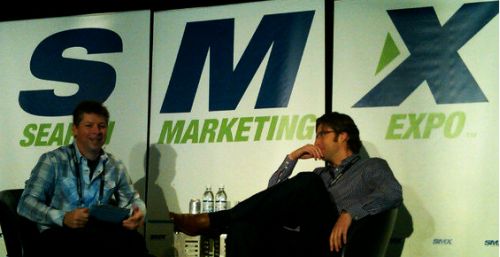Welcome to Day 2 of #SMX Advanced! The social side of search. Is there anything sexier? Stefan Weitz, Director at Bing and SEL’s Danny Sullivan sat down for a “fire side chat” to discuss, among other things, this very amalgamation. But before the candid Q&A, Stefan thoughtfully examined the significance of making the Internet, ergo search, more social(able). Peppered with best practices, neat statistics, actionable tips, and noteworthy takeaways, Stefan’s morning keynote was a stimulating way to kick off the last day of sessions here at #SMX. Read on for the full scoop.
After Stefan and Danny took the stage, Stefan introduced the agenda for his presentation.
- Honey Badger – Bing’s Update to Webmaster Tools
- Schema.org – What’s so cool about it?
- The “So” of Social – i.e., the “So What?” of Social
Honey Badger Don’t Give A Shi Care
The new update to Bing Webmaster Tools, rolling out today, has been coined “Honey Badger.” And much like everyone’s favorite furry viral beast, this Honey Badger is fierce, focused, it blows away obstacles, and aims for one single objective. In Bing’s case, the objective is to make your life better. Viral video honey badger just wants to eat. EVERYTHING. Also, unlike viral video honey badger, who don’t care, Bing Honey Badger does.
Features of Honey Badger
- Crawl Setting Management: Tell the spiders to come at 4 am when no one’s on your site, not at 9 am when people wake up and visit.
- Role Management: Give granular control to your settings to various team members.
- Toolbox Site Update: Videos, how to’s, data for you to use, helpful for training new people.
(Best automated tweet ever, I think).
Now, onto Schema.org.
Schema.org | Why Should We Care About It?
The web now is a web of objects. Everything we engage with is very detailed now, in a way it was not before. The data about a specific object on the web today is scattered across many places. Search engines have to travel many places to gather this data & assemble it into a single entity.
Schema.org will help collate the millions of sites out there with data about an object to make search engines’ lives easier, and the user experience more comprehensive overall.
Objects Lead to Action
Once search engines understand something is an object (and what object it is), they can associate actions with the object. For example, a restaurant is an object. To make a reservation is an action. One hang-up here is that the same object might have multiple variations across various channels, for example, film titles across Netflix, Hulu, etc.
“The unstructured web is very messy – it’s hard for us to do all this parsing & crawling,” Stefan explained. Enter stage right, Schema.org.
Schema.org will allow marketers to better mark up the objects on their webpage to as to best describe objects for engines. Marketers can even add extensions to describe more deeply objects.
- thing/product/weight
- thing/product/heigh
- thing/product/productID
Last but not least…
The “So” of Social | Why Social?
Why is social so important? Why should you care about social? Bing started out as a decision engine. Factored into the engine were decision tools, intelligent organization, core search, etc. Great start. But as Stefan smartly pointed out, “People are very emotional when they’re making decision.” Emotion wasn’t something Bing was able to factor into the user experience.
“The amount of data these poor engines need to crawl every day is exploding.” We as humans create 5 exabytes of data every day. I don’t even understand how much that is. Oh, wait. Here’s a breakdown:
All of this data were previously locked up in little black books, physical photo albums, memory boxes… all of this data is now accessible on the web. (So that’s where the exabytes are coming from!) Not only is it made known what we want (search), but who we know and what we like (social).
Key Benefits to Social Search
- Trusted Friend. Better decisions using your friends opinions.
- Collective IQ. Better search using the collective.
- Enabling Conversation. Find the expert, move search from passive to active.
Respective Bing Release Focuses:
- Opinion Infusion
- Interest Infusion
- Shopping, Travel, People Finder
Who Cares? Why Should They Care?
- Safety: Human beings are pack creatures. We like social interaction because it makes us feel safer. Social interaction surrounding search or e-Commerce makes us feel safer about our decisions.
- Higher Success: People who communicate in packs or work together generally have higher rates of attaining success.
- Happiness: Awww. It’s true – we’re happier with our decisions when we follow the path of someone who had the same problem or question earlier and solved it successfully.
But don’t forget – search quality is contingent upon social, objects, services, personal, intent models, topical. It’s more than just social.
Q&A
With that, Stefan wrapped up, and sat down. It was time for a true fire side chat between he and Danny Sullivan. Danny created a makeshift coffee table out of a branded Bing snowboard and some milk crates, and placed some charming tealights atop the table. Also atop the table was a framed photograph of an elderly man who seems to like Bing. The mood was set. Time to gab.
(Please Note: These Qs & As are lightly paraphrased.)
DS: Can you tell us a bit more about how you’re putting out scalable, direct answers?
SW: We do qualitative research regarding the most common tasks people do when they search for certain type of ter. (For example, if people do a search for a city, odds are they’re looking for weather, restaurants, maps, etc. From there, we build a framework of information sources that provide topical answers for specific queries. Answers will evolve away from collating info (which is important) to active answers, and the ability to get things done right on the SERPs (such as make a reservation via OpenTable right on the SERP).
DS: So, if I want to know the winners of the Oscars, does something like that need to be set up manually?
SW: Yes. It’s worth it to do manual work up front if it means more exposure of the power of Bing. We’ll also work to add similar types of results we think you may be interested in when you type “Oscars,” things you might not have thought to search for but that are related.
[At this point, Stefan retrieved a stuffed animal he claimed to be a honey badger, but I know it was really TY Beanie Baby Ringo the Raccoon.]
DS: So about Bing’s deal with Facebook that was announced October ’10″it’s finally starting to roll out. Is this a big shift?
SW: Initially, the decision engine we built was based on data and knowledge. We took large amounts of data and made sense of them one way or the other. But increasingly, people are looking to their friends for input when they make decisions, and the social aspect of Bing accommodates this. It rounds out the decision engine.
[Stefan shares a story about his mom seeing his own face on a particular product page about laptops, and how it impacted her. When she commented on this to him, he said,”Mom, you’re not getting a Mac!” *Cue laughter*]
DS: Regarding schema.org – aren’t you guys just supposed to do that stuff (RDF markups, microformatting) FOR us? It feels like it’s backwards in some ways…
[*Cue laughter*]
SW: Language is a complex thing – what with idioms, different ways of expressing thing s. We do a pretty good job these days. The challenge – or opportunity for people with a lot of content – for certain things, you’ll be able to give us much better details, hints, data about what’s on your page. You don’t have to do it, but if you do, we’ll be able to do a lot more things with it.
DS: Will Schema.org affect a site’s position in SERPs?
SW: Not now, but eventually – it’s one of the signals.
DS: Regarding Bing Social and integration with Facebook… how much do you use people’s Facebook information in the search experience?
SW: We follow the privacy settings you establish in Facebook. If you have your Wall blocked off and private, not published to the Newsfeed, we honor that. Up right corner of Bing SERPs you can log out and unpersonzlie your Bing results. In FB privacy settings, you can disable your integration/personalization with Bing.
DS: So what is this thing called? Bing with Facebook? Bing social?
SW: I think eventually it will just be called Bing.
DS: Regarding XBOX integreation with Bing…
SW: Yes, rolling out this fall [I believe], you’ll be able to search content via your XBOX with Bing.
And that about does ‘er! Awesome keynote, enlightening Q&A, all in all – two-thumbs up start to Day 2 of SMX Advanced. Stick around for more session captures here in AIMCLEAR blog, and follow along with live coverage under the good old hashtag, #SMX ,and, yeah, you guessed it, @beebow.











